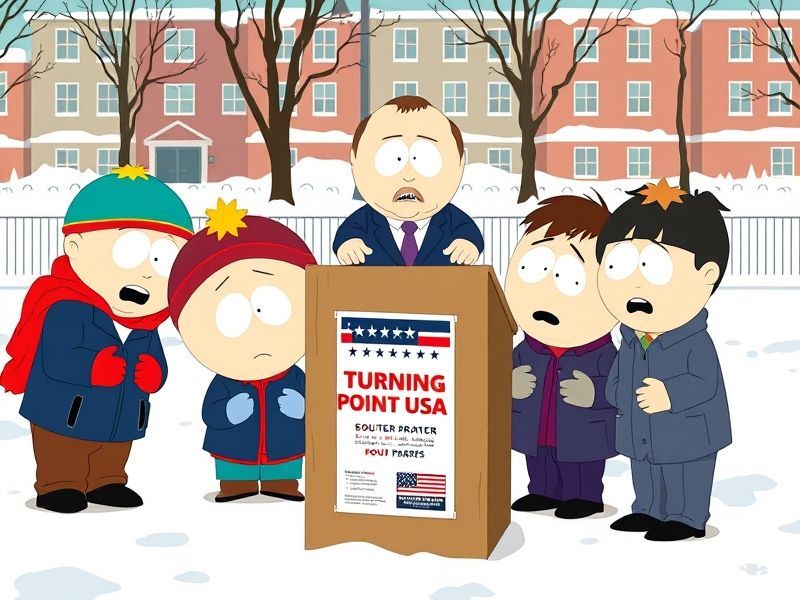Global Eye-Roll: How South Park vs Charlie Kirk Became the World’s Bizarre Political Reality Show
**When South Park Met Charlie Kirk: How Two American Cultural Icons Became the World’s Problem**
The news that South Park will dedicate an entire episode to Turning Point USA founder Charlie Kirk has triggered the kind of global eye-roll typically reserved for American tourists explaining constitutional amendments to Parisian waiters. From the cafes of Copenhagen to the karaoke bars of Seoul, the planet’s collective reaction has been remarkably unified: “Ah yes, the Americans are at it again, exporting their culture wars like processed cheese.”
For international observers, this collision represents something far more significant than another entry in America’s increasingly bizarre political entertainment complex. It’s a masterclass in how the world’s most powerful democracy has transformed its civic discourse into a reality show where the prize appears to be owning the largest collection of triggered liberals.
The episode, reportedly titled “The End of Obesity” (because subtlety died in 2016), promises to satirize both Kirk’s conservative activism and America’s pharmaceutical obsession. From a global perspective, it’s rather like watching Rome burn while the emperor live-streams it with sponsored content from weight-loss tea companies.
What makes this particularly fascinating to non-Americans is how perfectly it encapsulates the United States’ unique ability to monetize its own dysfunction. While other nations struggle with boring problems like healthcare and infrastructure, America has pioneered the political influencer economy, where ideological extremism pays better than most manufacturing jobs. Charlie Kirk, a man who looks like he was algorithmically generated to trigger college freshmen, has built an empire by selling the political equivalent of NFTs: valuable to exactly one demographic and confusing to everyone else.
South Park’s creators, Matt Stone and Trey Parker, have spent decades perfecting the art of offending everyone equally—a business model that somehow became more profitable than actual journalism. Their decision to target Kirk isn’t just comedy; it’s market research confirming that political polarization has become America’s most successful export after fast food and anxiety.
From Berlin to Bangalore, young people who can’t name their own local representatives can recite American culture war talking points with the enthusiasm of sports statistics. The Kirk-South Park showdown represents the latest shipment in America’s most successful export: weaponized political entertainment. It’s like cultural imperialism, but with more Twitter threads and fewer aircraft carriers.
The international implications are staggering. While China builds roads across Africa and Russia sells energy to Europe, America counters by sending podcasters and reaction videos. It’s soft power, but make it extremely hard to watch with your parents.
What’s particularly amusing to global audiences is how this episode will likely generate more international coverage than actual American foreign policy. The BBC will analyze it. Al Jazeera will debate it. Japanese television will turn it into a game show. Meanwhile, actual governance happens in the background like elevator music everyone politely ignores.
The episode’s real significance lies not in its content but in its inevitable aftermath: weeks of think pieces, Twitter wars, and YouTube commentary that will generate more revenue than the GDP of several island nations. It’s capitalism’s final form—turning political disagreement into content so engaging that viewers forget they’re not actually participating in democracy.
As the world watches America devour itself with the enthusiasm of a reality TV reunion special, other nations have begun to understand their role in this performance: we’re the audience, not the participants. The best we can hope for is that this particular episode includes enough musical numbers to make the cultural decline entertaining.
In the end, perhaps that’s South Park’s greatest achievement: reminding the world that American politics has become indistinguishable from its comedy, except comedy has better writers and more credible plotlines.







